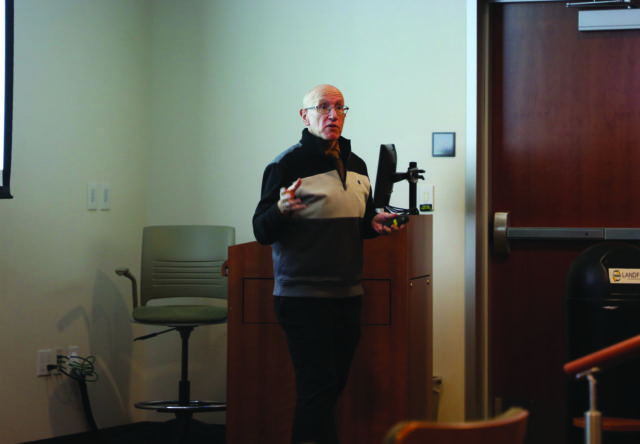By Pranay Malempati | Sports Writer
American Statistical Association president Ronald L. Wasserstein spoke to Baylor students and faculty on Thursday afternoon at Mars McLean Science Building. He explained why the scientific world needs to change the way it thinks about the significance of experimental results.
Wasserstein talked about how the world of science needs to move beyond having the target p-value of 0.05 determine if research is statistically significant.
In statistics, the p-value is the probability of finding the observed results of an experiment if the null hypothesis of the experiment is true. The null hypothesis predicts that no difference will be observed between the treatment and control groups in the experiment.
Wasserstein compared how people use the 0.05 p-value to how people use the dating app Tinder.
“You’ve opened up your Tinder,” Wasserstein said, “looking for a p-value that you would be happy with. What comes up on your screen is 0.03. 0.03 is less than 0.05, so you would swipe right. You would say you have come up with something and need to investigate it more.”
However, Wasserstein said that the 0.05 value is being used incorrectly. He believes that now, if a p-value is lower than 0.05, it is taken as proof of correct data and if it is greater than 0.05, the data is not able to be published.
Wasserstein said we need to move away from this strict usage of the p-value.
“Bright-line thinking is not good for science,” Wasserstein said. “Bright lines lead to bizarre behavior.”
Wasserstein said because of this bright-line thinking, useful data is potentially being stored away without being published if the p-value of the research is anywhere over 0.05.
Wasserstein further said that while the current use of the p-value is not correct, what it represents is even more important. He said that data below that 0.05 threshold is considered statistically significant, but people do not understand the term “significant” correctly in this context.
Wasserstein said that because people can take the word “significant” to mean the data has been proven true, this term can have undesired consequences. While it wouldn’t be harmful in some situations, Wasserstein said this phenomenon can be dangerous in cases of research about diseases such as Alzheimer’s.
He said while the Food and Drug Administration has not yet changed its p-value requirements, it is trying to make its process more effective.
“It’s a tough nut for the FDA because the stakes are so high,” Wasserstein said. “The people bringing the drug to the FDA, there’s a financial stake for those companies, but it’s [also] important to think about the effectiveness of the drug. They want to get their science right, but they don’t want to spend all their time in court.”
Temple senior Meg Taylor said she became interested in statistics after doing research in biochemistry. She said coming to this colloquium made choosing her future career more difficult.
“I know that I’m definitely interested in things like this,” Taylor said. “I don’t know if I want to address this from a scientific point of view or from a statistical. For me, it’s helping me see how things connect and how I want to shape the future.”
Wasserstein called for the scientific world to move away from hard-lined thinking and look at various aspects of research to determine its viability.
“We’re trying to look beyond that. We’re trying to ask ourselves, what if [statistician R.A Fisher] had never come up with that .05 business.? What would you do to get your research published,” Wasserstein said. “I would say what you do is: You do science, stop using the p-value as the statistically significant level, that ends the discussion and instead, you look at the p-value you got and everything else that you know and you make a case. You argue and figure out what you learned.”


